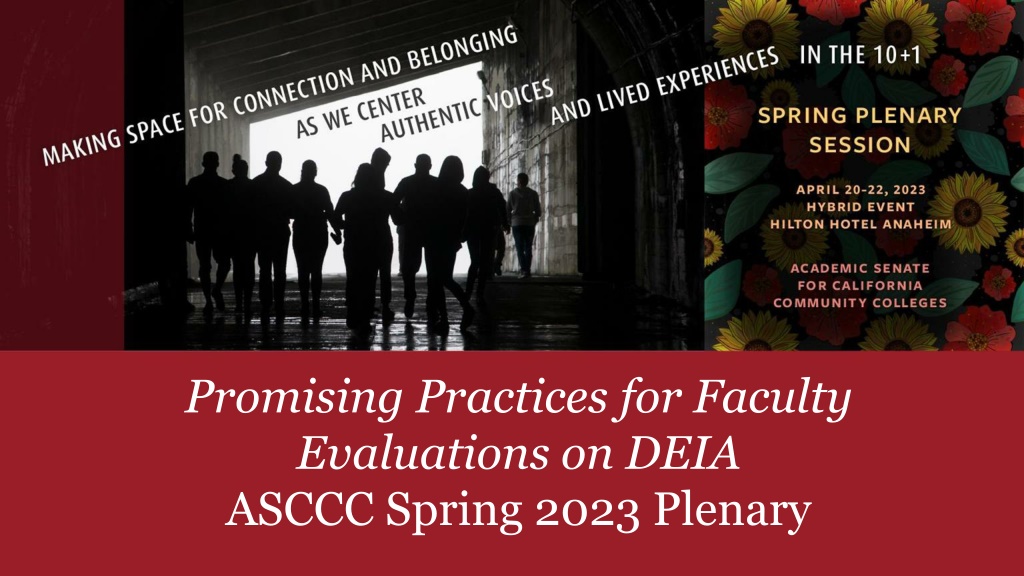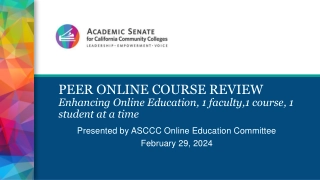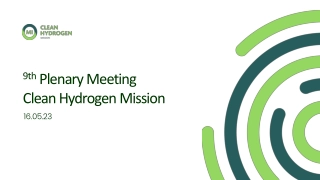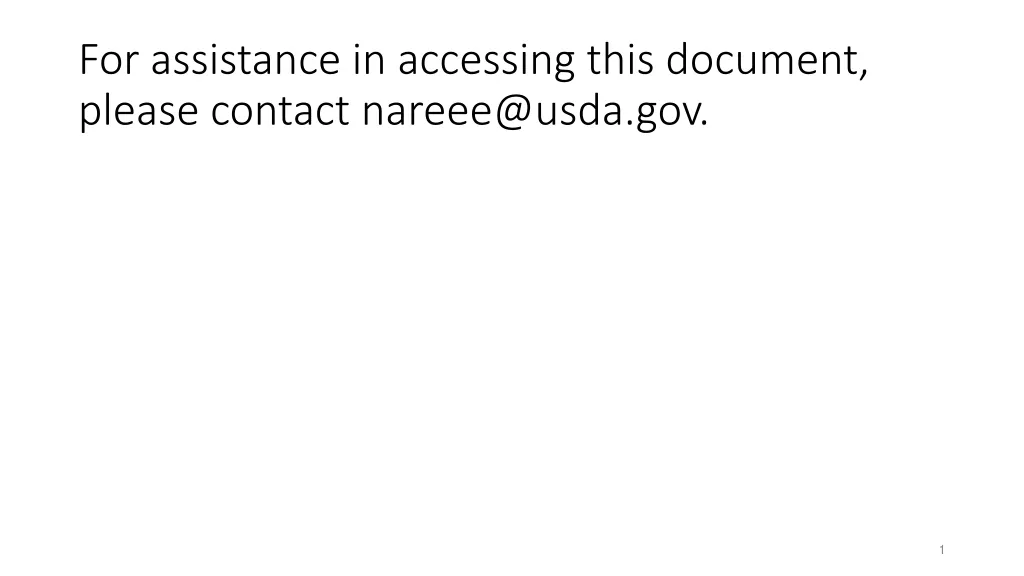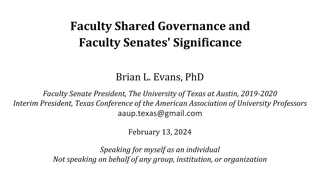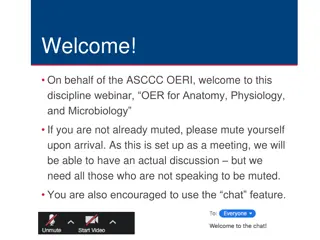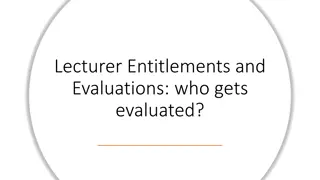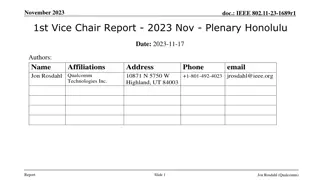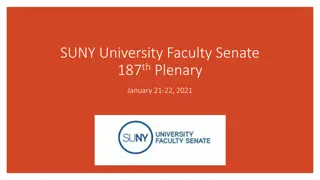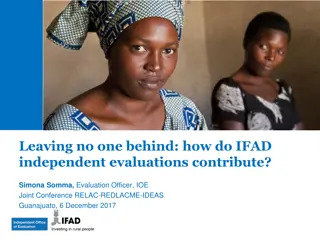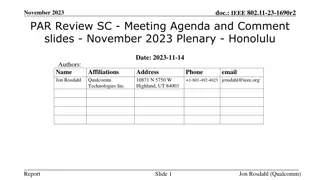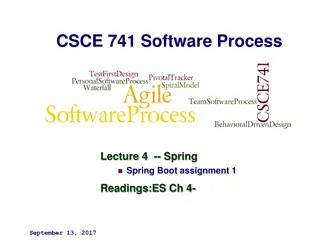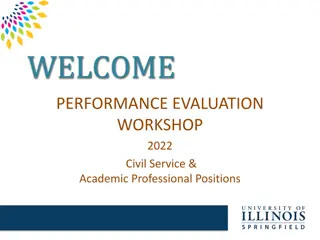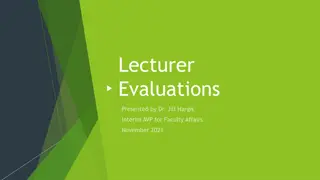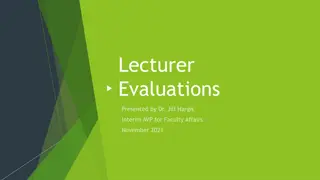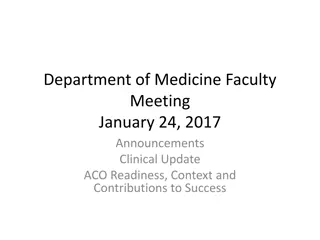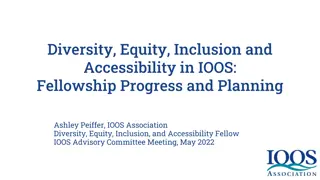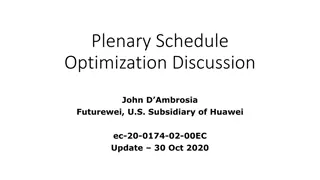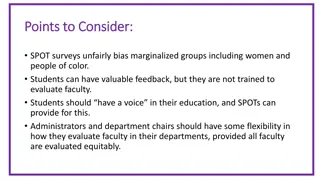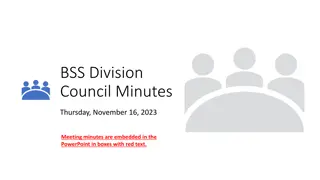Promising Practices for Faculty Evaluations in DEIA - ASCCC Spring 2023 Plenary
Explore promising practices for faculty evaluations focusing on Diversity, Equity, Inclusion, and Anti-Racism (DEIA) in the ASCCC Spring 2023 Plenary. Learn about Title 5 regulations, initiatives for systemic change, and creating a community of belonging through inclusive evaluations. Presenters include Michelle Velasquez Bean, Stephanie Curry, Sandra Guzmán, and Luke Laura.
Download Presentation

Please find below an Image/Link to download the presentation.
The content on the website is provided AS IS for your information and personal use only. It may not be sold, licensed, or shared on other websites without obtaining consent from the author. Download presentation by click this link. If you encounter any issues during the download, it is possible that the publisher has removed the file from their server.
E N D
Presentation Transcript
Promising Practices for Faculty Evaluations on DEIA ASCCC Spring 2023 Plenary
Presenters Michelle Velasquez Bean, ASCCC Treasurer Stephanie Curry, ASCCC Area A Representative Sandra Guzm n, Sacramento City College Luke Laura, MiraCosta College 2
Breakout Description Join us for a breakout on making actionable change in centering faculty evaluations in Diversity, Equity, Inclusion and Anti-Racism (DEIA). With the new Title 5 regulations for faculty evaluations grounded in DEIA, academic senates across the state will need to work with their local collective bargaining units to review current structures and propose dynamic systemic change in evaluation processes. Learn from fellow faculty members from Los Rios Community College District and MiraCosta College District who have taken the lead in purposeful infusion of DEIA into faculty evaluations. 3
The Foundation: Community of Belonging What would an ideal college look like? It would like like a group of scholars of all races and ethnicities centering the work, histories, and artistic production of marginalized, minoritized, colonized, Black, Latinx, Asian, Indigenous, immigrant, disabled, and queer people rather than viewing them as objects of study. . . . we must continue to rebel through our research and our praxis of thinking and doing . . . creating our own pockets of freedom in our classrooms, our communities of sustenance and belonging. Lorgia Garcia Pena, Community as Rebellion p.98 4
Title 5 Regulations Updated Regulation Approved By BOG, Chaptered and Effective April 26, 2023 Title 5 53602 a) District governing boards shall adopt policies for the evaluation of employee performance, including tenure reviews, that requires demonstrated, or progress toward, proficiency in the DEIA competencies published by the Chancellor (b) The evaluation of district employees must include consideration of an employee s demonstrated, or progress toward, proficiency in diversity, equity, inclusion, and accessibility (DEIA)-related competencies that enable work with diverse communities, as required by section 53425. District employees must have or establish proficiency in DEIA- related performance to teach, work, or lead within California community colleges. 5
Title 5 53206 c) To advance DEIA principles in community college employment, districts shall: (1) include DEIA competencies and criteria as a minimum standard for evaluating the performance of all employees; (2) ensure that evaluators have a uniform understanding of how to evaluate employees on DEIA competencies and criteria; (3) set clear expectations regarding employee performance related to DEIA principles, appropriately tailored to the employee s classification; (4) place significant emphasis on DEIA competencies in employee evaluation and tenure review processes to support employee growth, development, and career advancement; (5) ensure professional development opportunities support employee development of DEIA competencies that contribute to an inclusive campus and classroom culture and equitable student outcomes; (6) include a self-reflection and a comprehensive evaluation from appropriate evaluators who reflect a range of perspectives on an employee s performance. The evaluation process shall provide employees an opportunity to demonstrate their understanding of DEIA and anti-racist principles, including how the employee has operationalized DEIA in the performance of their job responsibilities. 6
Faculty Member Criteria Title 5 53605 (a) Faculty members shall employ teaching and learning practices and curriculum that reflect DEIA and anti-racist principles, and in particular respect for, and acknowledgement, of the diverse backgrounds of students and colleagues to improve equitable student outcomes and course completion. 7
EEO Diversity Best Practices Handbook https://www.cccco.edu/- /media/CCCCO- Website/Reports/cccco-eeoreport- 062022- a11y.pdf?la=en&hash=9D7F34D1 1B52A45F4C689F4AB733347067 E8BC3D 8
Senate Purview in Evaluations Education Code: 87663(f) Evaluation Procedures Requires that the collective bargaining agents, or faculty unions, consult with the academic senate prior to negotiating faculty evaluation procedures. Education Code: 87610.1(a) Evaluation Procedures Requires the collective bargaining agents, or faculty unions, consult with the academic senate prior to negotiating tenure evaluation procedures. 9
Los Rios In partnership with the Academic Senate, in 2020 a workgroup was convened ( The Equity Workgroup ) and charged with developing a program for mandatory equity-related professional development. The proposal was first vetted via local Academic Senates and was then forwarded to the LRCFT and LRCCD for consideration. Contractual changes included Equity reflection and changes to College Service form. Any hours related to the required anti-racism/equity trainings will be carved out of College Service hours. The College Service and Compliance Training form now includes an equity minded professional development component. Creation of a mandatory Equity Reflection for all faculty 10
Los Rios Equity Reflection in Performance Review Document is turned in at the same time as the Self-Study during performance review. Reflection is not part of the formal performance review. The reflection cannot be used to support a rating of less than satisfactory. The equity reflection asks all faculty to think about the work they have done and plan to do related to equity. Equity reflection will be incorporated as part of the 2023-2026 collective bargaining agreement, unless either party indicates its desire to modify or eliminate the statement 11
Los Rios Self-study equity reflection questions 1) What have you done to improve your understanding of anti-racism, equity, equity- mindedness, and/or equity as it relates to your field and the LRCCD? This might include, but is not limited to the following curriculum review related to anti-racism, decolonization, and equity participation in anti-racism and equity related workshops/institutes review of professional materials and best practices for equity in your field and/or review of your student success data 2) How have you used and/or how will you use these understandings to improve your practice and/or help close opportunity gaps? 3) What additional trainings and resources, whether offered by LRCCD or others, would be helpful in continuing your development of anti-racist practices? 12
Los Rios Current considerations During the 2023-2024 Academic Year, faculty are required to complete at least six (6) hours of Equity Minded Professional Development. During the 2024-2025 Academic Year, faculty are required to complete at least ten (10) hours of Equity Minded Professional Development. During the 2025-2026 and subsequent Academic Years, faculty are required to complete at least twelve (12) hours of Equity Minded Professional Development activities. 13
MiraCosta History of DEIA in Evaluation Criteria at MiraCosta Evaluation Criteria (4 of 5 criteria have DEIA components) Demonstrated skill in . This may include:.. Demonstrating a commitment to cultural competence and equity-minded pedagogies; Continued professional growth, which may be demonstrated by:... Engaging in personal and professional development related to cultural competence and equity-minded practices; Candidate Self-Study The self-study should also include a reflection that outlines contributions to diversity, equity, and inclusion on an individual, departmental or institutional level. 14
Questions 15
